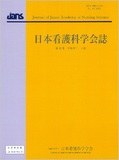Japanese
English
- 販売していません
- Abstract 文献概要
- 参考文献 Reference
要旨
目的:本研究の目的は,急性期病棟において終末期がん患者と向き合う看護の意味についてインタビューの分析から検討することである.
方法:終末期がん看護経験年数5年以上の看護師6名を対象に半構造化面接を行い現象学的方法に基づき分析した.
結果:看護師の経験から,3個のテーマ;1.患者が経験する「死」の時間をともに生きる,2.回復を支える看護vs.回復にとらわれない死を支える看護のジレンマ,3.終末期ケアの看護の意味と価値の探求,17個のサブテーマが抽出された.
結論:看護師は一人ひとりの患者が生きる生と死を,時には支え時には患者と肩を並べて死についてともに視て話す経験をしており,それは患者の生と死を「つなぐ」看護の意味を持つ.さらに患者の回復を目指す多くの業務を遂行する中で患者の死と向きあう不安に迷いつつ看護師自身の生と死に直面しながら看護の意味を探求しているといえる.
Objective: This study aims to investigate the meaning of nursing care for patients with terminal-stage cancer in acute care units in general hospitals by analyzing the experiences of nurses working in these units.
Methods: Six nurses with<5 years of terminal cancer nursing experience participated in semi structured interviews, and their responses were analyzed using Colaizzi's phenomenological method.
Results: The following three themes were identified in relation to nurses' experiences in end-of-life cancer nursing: (1) living with terminally ill patients, (2) dilemma of nursing support for recovery versus nursing support for death without recovery, and (3) search for meaning and value in end-of-life care nursing. Seventeen subthemes were identified.
Conclusion: Nurses have had the experience of being with each patient, supporting them in their life and death, and sometimes standing side by side with them as they witness and discuss death. This nursing entails "mediating" the patient's life and death. Furthermore, while dealing with the anxiety and hesitancy of dealing with a death of a patient in the course of many tasks for the patient's recovery, nurses also face their own life and death through nursing and are seeking the meaning of nursing.
Copyright © 2023, Japan Academy of Nursing Science. All rights reserved.


